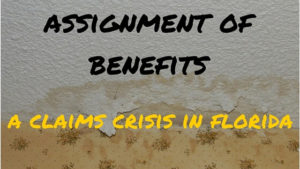A quick guide on how to avoid falling victim to Assignment of Benefits fraud and abuse
Maybe you’ve just made an emergency call to a water extraction firm after discovering a flood in your kitchen.
Or a salesperson knocks on your door and asks to inspect your roof, saying you likely have damage due to recent storms.
Or a stranger in a repair truck pulls up alongside youin a shopping center parking lot, saying they noticed your car windshield
is cracked and it can be replaced on the spot – for free.
Scenarios like these play out across Florida every day, and the story is hauntingly familiar. The repair person pulls out
a document and says they can fix everything, but first you need to sign here. They promise to work directly with your
insurance company, and say you won’t have to worry about a thing. At that moment, alarm bells should go off in your head. If you sign, you could become the latest victim of “Assignment of Benefits” fraud and abuse. And it may prove very costly to you and your family.
What is Assignment of Benefits?
Assignment of Benefits, or AOB for short, is a provision in a vendor’s repair contract. Originally called a “direction to pay,” a cottage industry of billboard trial lawyers and shady repair firms have found a way to exploit AOBs. They lure unsuspecting consumers to sign sweeping AOB authorizations that essentially result in the consumer handing over all of the rights and benefits of the insurance policies they bought and paid for.
By asking you to sign an AOB, a third party may be attempting to take over your insurance policy!
What are the risks of signing an AOB?
When you sign an AOB, you could unintentionally give the vendor the power to dramatically inflate the scope and cost of your claim. And if your insurance company disputes the bill, you may be on the hook for paying the difference out of your own pocket.
Worse yet, some unscrupulous trial lawyers and vendors are using AOBs to file lawsuits against the consumer’s insurance company, without their knowledge or consent. It’s hard to believe, but your insurance policy can be used by a third party to sue your insurance company over your claim, even if you don’t want to sue. That could result in you being dragged into depositions and protracted litigation over your claim, and waiving your .
So how can I avoid being an AOB scam victim?
There are some very simple steps you can take to avoid falling prey to AOB fraud and abuse:
• If your home suffers any type of damage, contact your insurance agent and/or your insurance company FIRST, and as soon as possible. Remember, they are contractually responsible to you, and in the best position to assist you quickly.
• Do not allow a third party – such as a water remediation firm, a roofing company or a trial attorney – to contact your insurance company for you. You have a duty under your insurance policy to contact your insurer.
• Document all your damaged property by taking photos and videos. After your immediate emergency has been mitigated, don’t allow the vendor to begin significant repairs until your insurance company has inspected the damage, or you could jeopardize coverage under your policy.
• If you are asked to sign an Assignment of Benefits form by a repair firm or attorney, make sure you read it carefully and understand clearly what rights and benefits under your insurance policy you may be signing away. Seek input from your agent, your insurance company or your personal attorney.
• If your vehicle windshield is cracked or chipped, alert your auto insurer to get the damage repaired. Do not allow a stranger to replace it for you and say they will deal directly with your insurance company. You may end up paying more for repairs than necessary or getting shoddy work done.
• Ask your plumber if they get a referral fee from any water or mold remediation vendor they recommend. If the answer is yes, that is a big red flag.
• Beware, many AOBs include a cancellation fee that you may be forced to pay, even if the vendor did no work.
• Understand you do not need to sign an AOB in order to get your insurance claim processed or your home or auto repaired – ever. If a repair vendor tells you otherwise, that is another big red flag.
• Make sure you stay in control of the home and auto insurance policies that you bought and paid for. Do not unknowingly sign away that control to a third party who may not have your best interests at heart.

 D5 Creation
D5 Creation